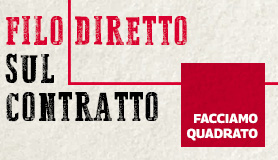The Guardian: IN SEARCH OF JUSTICE. Italy is embroiled in a bitter diplomatic row over its lettori
Italy's 1,500 lettori - foreign-language lecturers - have won the backing of the British and French governments in a new bid to end their long battle against discrimination by the Italian university authorities


IN SEARCH OF JUSTICE. Italy is embroiled in a bitter diplomatic row over its lettori (7/3/00)
________________________
Italy's 1,500 lettori - foreign-language lecturers - have won the backing of the British and French governments in a new bid to end their long battle against discrimination by the Italian university authorities. The case, which has cast a cloud over the credibility of basic principles, is fast winning the reputation of being the most blatant example of systematic violation of the treaties in the history of the EU.
Foreign secretary Robin Cook and single market minister Helen Liddell recently pledged the lecturers the British government's full official support. Britain will join forces with the European Commission as party litigant at the European Court of Justice in Luxembourg, where the lecturers' record fourth freedom of movement case is pending.
French premier Lionel Jospin has called for "a common approach aimed at eliminating discrimination based on nationality in Italy". Monique Cerisier ben Guiga, the French MP responsible for the welfare of overseas French citizens, is pressing Jospin to take diplomatic measures against Italy in order to have the rights of lettori under EU law recognised by their employers. But the lecturers fear that even the most favourable of outcomes at the ECJ next year would only lead them back into the labyrinthine Italian court system for another decade in the attempt to have the decision implemented. The real significance of British and French intervention, they feel, is that it at last allows governments to become formally engaged at the political level.
The need for a political solution was expressed in an official complaint to European ombudsman Jacob Soderman last October. It called for the immediate suspension of current infringement proceedings on the grounds that poor administration and perhaps even foul play by the previous disgraced commission - which resigned en masse last March after revelations of fraud, nepotism and mismanagement - had weakened their case by dropping the issue of status and reducing that of acquired rights.
It raised the possibility of suing the commission for damages under non-contractual liability on the grounds that it had misled the lecturers, many of whom claim their sackings and economic and psychological hardships were the result of following the commission's advice.
SNP MEP and law professor Neil MacCormick, who is championing the lecturers' cause, described the new commission's behaviour as "outrageous" and has called for urgent action. He said: "Mr Prodi has just made a statement in parliament promising a new deal in the way of open government and transparency. But at the very same time the commission has maintained a wall of secrecy about its conduct of litigation in the Italian foreign lecturers' case."
Scotsman David Petrie, 48, chairman of the Association of Foreign Language Lecturers in Italy, ALLSI, which lodged the complaint, said: "Governments are constantly giving us the hard sell on the benefits of the union, but our experience shows that transforming EU citizens' rights into reality is an issue they'd rather not deal with." He added: "If Tony Blair's government can get Gerry Adams and David Trimble into the same room, then surely the EU ought to be able to sort out a labour dispute involving EU citizens who are trying to teach EU languages and reside peacefully in another member state."
The Danish government has meanwhile announced its formal intervention on the lecturers' behalf against the commission's refusal to grant access to two sets of documents pertaining to their case.
The Swedish government is considering similar action.
A personal letter from commission president Romano Prodi to the lecturers, after a meeting between lecturers' representatives and commission officials in Brussels last December, has produced an air of cautious optimism. But the signing of a new statute for the mass promotion of some 700 graduate technicians to fully tenured lecturers at La Sapienza university in Rome last week has predictably met with a welter of protests: the lecturers were last year denied a similar solution by the Italian higher education ministry, on the grounds that promotion was only possible through the established national competitive examination system of concorsi. Predictably, a new case has already been launched to annul the statute.
Servizi e comunicazioni
I bandi in Gazzetta Ufficiale
I più letti
Lettori e CEL: iscriviti alla mailing list
Partecipa al gruppo di discussione dei Lettori e CEL, invia una email a lettori+subscribe@flcgil.it








